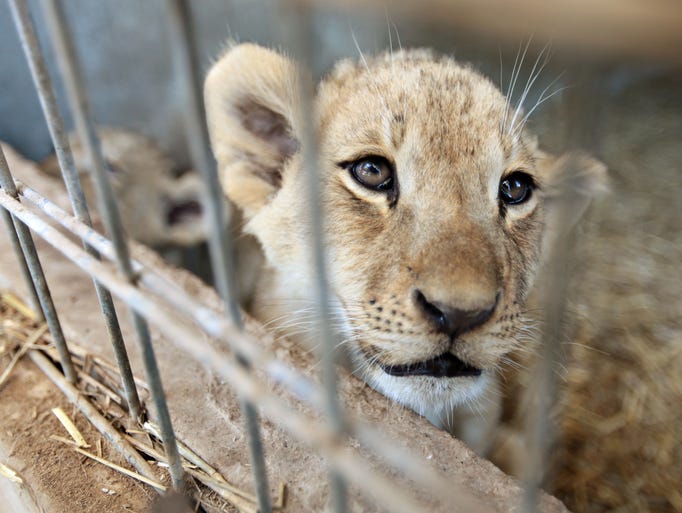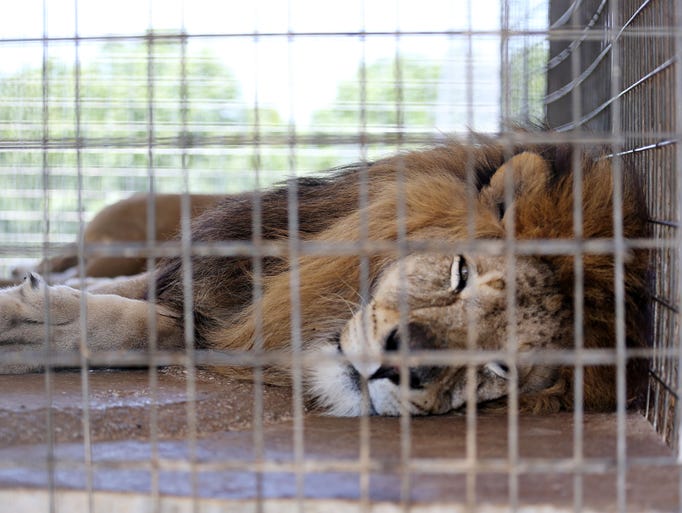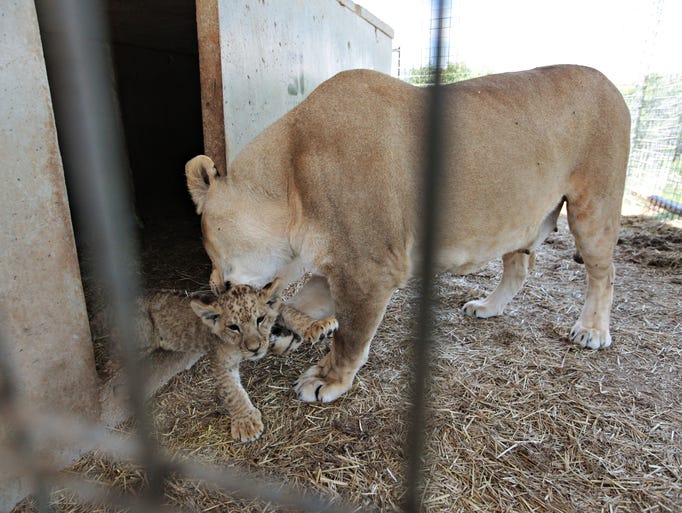Just ask Leo, a 450-pound lion living at the National Tiger Sanctuary in Saddlebrooke. He is the suspected father of two lion cubs born on March 20. Because the sanctuary does not breed animals, these two furry "surprises" are the first animals born at the sanctuary since it was founded in 2000.
"When we rescued five lions that all lived together about a year and a half ago, there were two males and three females," explained Abbie Knudsen, executive director for the sanctuary. "Well, lions are social. They can build strong bonds with each other. We wanted the family to be able to stay together. In order to do that and not produce cubs, we did a vasectomy on both males on the day we moved them.
"Just like with humans, there is always a chance that it didn't take. That is obviously what has happened here."
The cubs each weighed about two pounds when they were born. Today, at 11 weeks old, they weigh more than 20 pounds each. Knudsen said she expects them to weigh about 100 pounds by their first birthday and grow to a whopping 400-450 pounds like their daddy.
The cubs — both male — have been introduced to meat, but still nurse from mom Niara.
To ensure Niara is not stressed or nervous about strangers being around her babies, the lions' habitat is currently off limits except to staff and as part of the "behind the scenes tour."
Knudsen said construction of new habitats near the lions was put on hold. And a second attempt to give Leo a vasectomy will have to wait until Niara is able tolerate the commotion likely to happen when Leo is anesthetized. "Sometimes moms in captivity will kill their cubs. They reject the babies, not take care of them, (and their) milk will dry up. That is all a result of you don't have a happy mom. So people take them away and put them on display," she said. "We want to make sure that we are providing Niara with a stress-free, healthy environment where she feels comfortable raising the babies on her own.
"Being with mom will definitely be the best bet for them to develop into healthy adults," Knudsen said.
One of the veterinarians at the sanctuary volunteers in Bungoma, a rural, poor village in Kenya. Schoolchildren there have been following news of the two cubs. Those children were also charged with naming the cubs. On Wednesday, sanctuary staff learned of the cubs' Swahili names: Wafula (meaning "born during rainstorm") and Wanjala (meaning "born during famine").
Like all the animals at the sanctuary, Wafula and Wanjala will spend their lives there.
About the National Tiger Sanctuary
The National Tiger Sanctuary was founded in 2000 near St. Louis. It moved to a 100-acre tract of land about 10 miles north of Branson with eight big cats.
With the addition of the two lion cubs, there are now 32 big cats living at the sanctuary, along with lemurs, 12 domestic dogs and seven domestic cats — all rescue animals coming from private owners, zoos and the performing industry.
The five lions, for example, were bought as cubs by a man who intended to start a breeding program, Knudsen said. "He lost his job and he disappeared," she said. "The property owner where he kept the animals didn't want the cats. He called us to take them."
The lions could not go to a zoo because they were not "genetically pure" and therefore could not be part of a zoo's breeding program. "(Zoos) are only breeding cats that could potentially be eligible for re-release. So they are looking for pure (cats) of a single subspecies," Knudsen said. "They are not willing to breed any hybrids. Pretty much all of the animals that are from pet trade and the performing industry, they were not responsibly bred.
"That is why zoos look for places like this to give them a permanent home."
To learn more, visit NationalTigerSanctuary.org or call 417-587-3633.
source
Niara, a female lion, cares for one of her two cubs at the National Tiger Sanctuary on Wednesday, June 10, 2015.








No comments:
Post a Comment